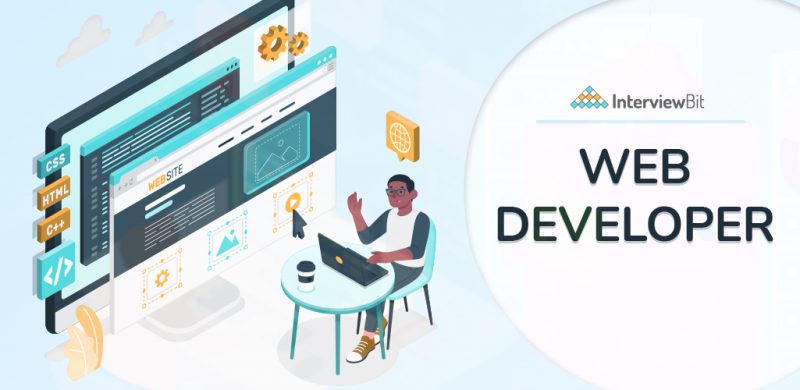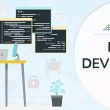- What is Web Development?
- Who is a Web Developer and What does he do?
- What is the Demand for this Role?
- Web Developer Salary
- How to Become a Web Developer
- Web Developer Job Description
- Web Developer Roles/Job Designation
- Web Developer Resume
- Who Hires Web Developers?
- How to Prepare for Web Development Interviews?
- Conclusion:
- FAQs
- Additional Resources
What is Web Development?
Web Development is the fabrication and preservation of websites. This is done in order to help improve the looks of a website and help make it work smooth and fast. Hence the entire job of a web developer is to provide a faultless and flawless experience to the user during the usage of a website.
Web developers, also known as ‘devs’ achieve this through coding in multiple languages. This is primarily dependent on the complexity of tasks they need to achieve and the platforms on which they are working.
The rise in the demand of a web developer can easily be related to the digitalisation of all assets and businesses over the last decade. This has created a new pool of high end paying jobs which do not necessarily need a masters degree to be a certified professional, making web development a great career option for all Computer Science enthusiasts.
Confused about your next job?
There are two fields in web development: Front End and Back End.
Who is a Web Developer and What does he do?
Web Developer is the one who designs websites and instructs various operations of how the websites should work. Web developers follow a bottom up approach while developing a website. The design is simplified in such a way that the end user’s journey of traversing through the website is extremely simple. At the same time, utmost care is taken that the website is not too simple in the context that it lacks appeal to up to date users.
Web development can broadly be divided in three parts: client side programming, server side programming and the management of data. The three parts take care of what the users see on the websites, the code powering the back end of the website and the servers and database which keeps the operation up and running respectively.
Web Developers mainly create and maintain websites keeping the interest of the users and the clear representation of product / service in mind. Generally, there are a few developers who build the backend infrastructure of the website, which are called backend engineers, and the others who develop the UI/UX (User Interface / User Experience) are called front end developers.
Web development can be client centric and revolves around the project requirement and its complexity. The first step of web development would be having a requirement analysis discussion with the client and getting to know the expectation from the project at hand. The next step is to design a user-friendly interface and provide contents of the website. In the end, the focus shifts on the deployment of the website, such that the functionality is accessible through all the types of web browsers. There might be an additional contractual obligation of constantly maintaining and updating the website as per need basis.
Web developers are well aware about the operation of servers and the networking that goes in behind creating a website.The tech stack being used by a web developer are: HyperText Markup Language (HTML), JavaScript (JS), Ruby on Rails, Python, and C++.
What is the Demand for this Role?
According to the U.S. Bureau of Labor Statistics, “the employment of web developers is projected to grow 13 percent from 2018 to 2028, much faster than the average for all occupations,” adding that their demand “ will be driven by the growing popularity of mobile devices and ecommerce.”.
With the growing digitalization around the world the demand for a web developer is constantly on the rise. As everything is shifting online – from business to govt initiatives and from all local enterprises to MNC’s. The trend is so strong that the industry demand for web developers is always more than than currently supply in the market.
Web Developer Salary
The major parameter that determines the pay of a web developer are as follows:
Experience – Since an experienced person knows how to handle situations in a mature way, it is very natural that the leverage over the salary has a slight advantage for the more experienced web developers.
Location – The growth associated to a particular place is directly proportional to the kind of remuneration a company would offer. The cost of living of a place, labor wages over there and location competitiveness also add to the salary range for a particular location. But with the pandemic, location is slowly becoming the not-so-important factor as the Hybrid / Work from Home mechanism is gaining traction.
Company – This can be again directly correlated to the salary of an individual. But the general trend is that we see many startups having a likelihood towards the freshers while the more experienced people are sought out by the well-established and reputed employers because of the company’s great financial standings.
Skill – The better the skills, it is highly likely that one lands a better paying job. Since the web developer job requires a multi dimensional skill set it is very important to note that the more the experience in different environments and tech stack – more the value for any employer. Things are changing rapidly and some technologies in web development might be in more demand. So relevancy matters.
Pay by Experience – Entry level, Mid level, and Experienced level.
It is very normal to understand that there is nothing that can be ranked over experience. Hence it is but obvious that as you grow ripe in the environment of being a web developer, the growth comes along. So based on the experience of an individual, we can categorise the salary as follows:
Entry Level – The entry level web developer’s salary in India on an average is ₹19339.2/month
It generally ranges between ₹ 8333 – ₹ 42916 / month.

Mid Level – The mid level web developer’s salary in India on an average is ₹19339.2/month
It generally ranges between ₹ 22666 – ₹ 83333 / month.

Experienced Level – The experienced level web developer’s salary in India on average is ₹1,006,429/month
It generally ranges between ₹ 24083 – ₹ 166666 / month.

Pay by Location – Mention the major cities and average salary in these cities.
The urban locations definitely have a higher pay with respect to the urban places. Although in the current induced work from home setup, there are times when the location factors get ruled out. But companies placing out of Hyderabad (27% higher than the national average) and Bangalore (25% higher than the national average) have a slight edge over talent acquisition. Mumbai, Pune and Chennai do fairly well. But the latest trend has seen the compensation going down specially in Delhi (1% lower than the national average) and Kolkata (22% lower than the national average) which have taken a massive hit.
A Web Developer’s Salary in Bangalore on an average is ₹34000/month.
A Web Developer’s Salary in Pune on an average is ₹30000/month.
A Web Developer’s Salary in Kolkata on an average is ₹25000/month.
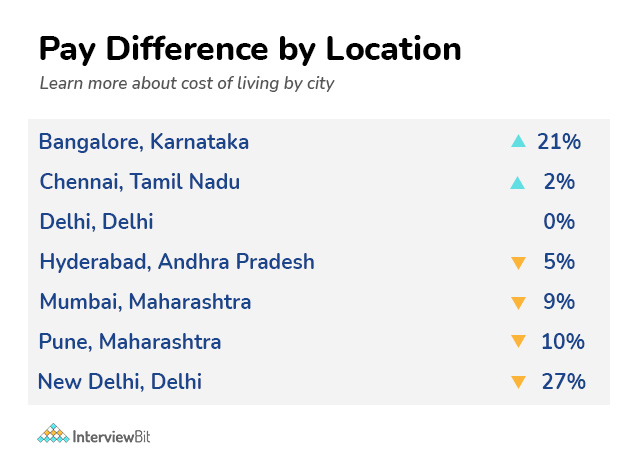
Pay by Company:
It is a prevalent notion that the salary of web developers is higher in the bigger corporate houses and brands. Given below is a rough pay by company in ascending order with a range of salary which spreads across different levels: entry, mid and experienced levels.
A Web Developer’s Salary in TCS on an average is ₹20000-₹60000/month
A Web Developer’s Salary in Cognizant on an average is ₹20000-₹150000/month
A Web Developer’s Salary in Accenture on an average is ₹22000-₹75000/month
A Web Developer’s Salary in Infosys on an average is ₹30000-₹50000/month
A Web Developer’s Salary in Capgemini on an average is ₹70000/month
A Web Developer’s Salary in HCL Tech on an average is ₹25000-₹80000/month
A Web Developer’s Salary in Directi on an average is ₹35000-₹100000/month
A Web Developer’s Salary in Amazon on an average is ₹40000-₹150000/month
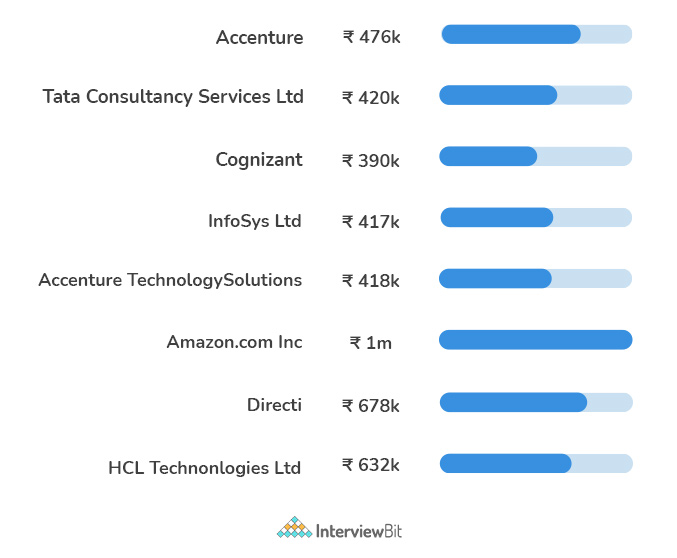
Pay based on Skills:
All web developers, front end developer, back end developer or a full stack developer receive different salaries. It is all because of the skill set that the employer compensates the employee. Knowing comparatively simpler technologies like Hyper Text Markup Language or Cascading Style Sheets will only fetch a fairly simple salary. The newer tech stacks like MERN (MongoDB Express React and Node.Js), MEAN (MongoDB Express Angular and Node.Js) are more in demand skill sets.
A person skilled in Java Script will have an average salary of around ₹35000 per month whereas a person only skilled at HTML might only fetch ₹25000 per month. The combination of multiple tech stacks help in the exponential rise of the salary of web developers.
A Web Developer’s Salary based on skill set can also be seen through the job profile and the work expectation one has. A front end engineer averages ₹35000/month, while a back end engineer averages ₹30000/month. The maximum compensation is for a full stack engineer who receives somewhere north of ₹50000/month as an average salary.
Check this link to get more information on web developer salary.
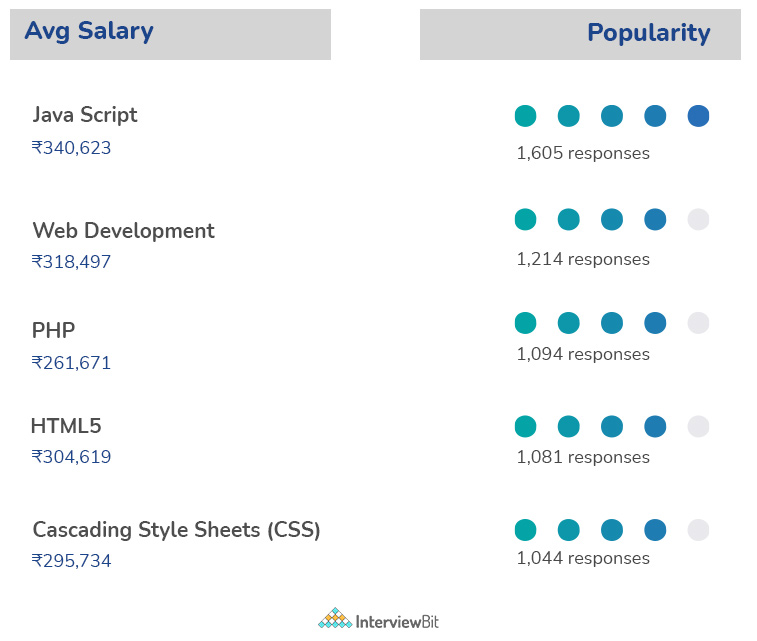
How to Become a Web Developer
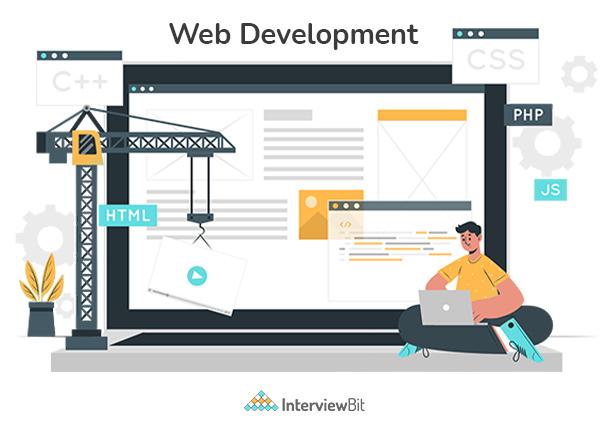
Tips to become a good web developer:
In order to become a good web developer, an individual would need to follow a holistic approach which is more oriented towards the outcome of the development. The various steps to do so are as follows:
- Learning of Web Development Fundamentals – First things first, knowing the basics of Hyper Text Markup Language (HTML), Cascading Style Sheet(CSS) and JavaScript would be a great start. We have seen a new era of masterclass and knowledge sharing sessions from industry experts that completely focus on a specific aspect of web development and help implement live descriptive projects on the go to pass on hands-on experience to the attendees. This brings individuals who are ready to face the industrial challenges and conquer with their knowledge. It is just important to note that people doing mid-career transition or constantly trying to upskill themselves and stay in demand in this booming field need to stay rooted to their fundamentals.
- Choosing Stream of Specialization – Answering this tricky and interest based question is the next step in the journey of being a web developer. What is the stream of web development that excites you as an individual? This bring us to a cross-road where we need to make a decisive decision on the available career paths:
Front End: This majorly involves a client-side role in which there is a constant touch base with the demands of the users and how the end design looks like of the website which includes the way users interact..
Back End: This majorly involves a server-side role in which there is a focus on maintenance of the website, hosting and deployment. A major focus is also towards the database and the servers.
Full Stack Development: A web developer who works with both sides of the website i.e. front-end and back end.
- Learning Tech Stack – Depending upon the interest as a web developer there are multiple development technologies which are relevant to the industry. For starters, to understand every aspect of web development one can thoroughly learn:
1. MERN Stack
2. MEAN Stack
3. Python based libraries or frameworks like Django, etc.
- Live Project Implementation – Once the fundamentals are grasped we can start implementing the project to get onboarded with the hard skills relevant in the world of development. Usage of GitHub, coding in SQL or jQuery improves and enhances one’s real time knowledge base. The important skills when we check responsive behaviour of a fully functional website. Handling situations like these strengthen one’s design principle.
- Building Portfolio – Developing a portfolio might be tricky and hence one can follow this approach of building a complete portfolio. Firstly, your work should highlight all the different types of work you have achieved which are distinctively different and not redundant – this adds an element of your skillfulness. You can also modify it based on the role that you are applying for. Secondly, highlight the unique skills you possess which would be a highlight for you to stand out from the crowd. Thirdly, highlight the various steps you have taken to refine the process.This might include proper documentation, organised code and proper representation and output of the functionality.
The Education Qualifications necessary to become a web developer:
The most common degree that web developers have is in the fields of Computer Science and Information Technology. Some also may have taken a course or two in Designing. Most people generally have a bachelor’s or Master’s degree in the fields mentioned above.
Personal tips to be a master Web Developer:
Some of the tips which I can personally give in order to master web development are as follows:
- Keep your basics and fundamental knowledge clear.
- Program while learning fundamentals. It will help clear concepts and write efficient codes.
- Irrespective of being a back-end or a front-end engineer, basic knowledge should be attained of both the worlds to relate to the product and the end user experience that you are about to create.
- Keep Networking and stay relevant to the industry.
- Keep Learning new coding language and techniques as there is a quick transformation happening in the world of web developers. Hence, staying relevant to the industry.
Skills and Tools Required to become a Web Developer
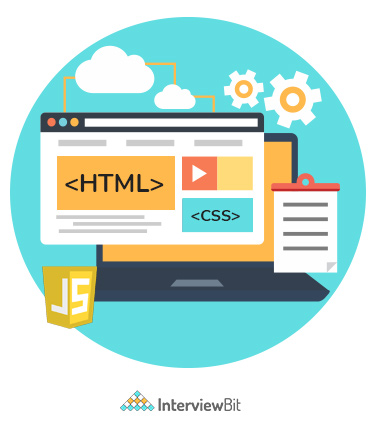
Few of the most commonly needed skills and tools to become a web developer are as follows:
- HTML/CSS skills: Having the common and basic knowledge of HTML and CSS is rudimentary and necessary for any web developer. These are the most generic and world wide followed languages in web development. Creating and styling are two aspects which are taken care of using the mentioned skills.
- Analytical Thinking: Examining existing code bases and making modifications to them is a very common skill one should possess. Apart from the technical changes – the demand of all the clients needs to be understood and implemented properly. We need to be agile with our processes here and make sure to make the website as required by the clients.
- Responsive web page skills: The adaptability of various screen and screen sizes is the biggest challenge that one needs to understand and cater. If it is not responsive or is not able to adapt to the viewability of any screens – the purpose gets defeated. Hence, an improvement in this regard is very important.
- Javascript skills: In order to meet high end demands of the clients, skill in Javascript can be highly regarded and can ease your work to significant amounts. Learning such in-demand and useful skills help solve complex problems and meet clients’ needs.
- Communication skills: Interacting and collaborating with colleagues and clients is an integral part of the job. If we can be clear in our approach and precise to the point, the execution will become swift and fast for everyone involved in the process.
- Testing skills: If you are facing non-responsive pages or the web page does not look like the way it was supposed to be. We need to work extensively on debugging and finding the root cause of failure and fixing as per our requirement.
- Basics of back-end: As mentioned earlier, we need a mix of all things in our knowledge as the consumption of API’s on the front-end happen in sync with the back-end operation. So having the skill to understand parts of it is an add-on.
- SEO: Ranking and visibility of a website is equally important. If it does not reach out to the right audience in the right manner. All the aesthetics and functionality of the website have no major meaning. Until the purpose is served we need to closely monitor and look at this aspect.
Ways to improve your skills is to focus and work on live projects where you can focus on your coding skills, learn technologies that will help you to be relevant to the industry and lastly improve communication skills. Know more about web developer skills here.
Some basic and advanced tools needed to be a web developer are as follows:
- HTML & CSS: Emphasising on this is very important as they form the building pillars of web development.
- JavaScript: It is the most sought out for language in web development. This is so because it helps us do a lot of operations and meet demands.
- GIT and GITHUB – Sharing and co-creating does not get any better if you learn and master the art of using GIT and GITHUB. This provides a seamless way of developing, constantly engaging and spreading ideas using Code Reviews and finally working on CI-CD pipeline.
- JS Library: Since we cannot start building everything from scratch. The JS library offers us a collection of classes and implemented functionalities which will really help cut down time. Not only will it reduce efforts but will help you to focus on the important aspects of development and the needs. React and Redux are two examples of JS Libraries which are heavily used by the software industry.
- API’s
- Problem solving & Management tools: Looking at the probable fix and allotting the right amount of time and resources to complete projects in an effective and time bound fashion is key to excelling in the role and must be followed.
- Testing and writing test scenarios: Covering all edge scenarios does not only make your website robust but it also adds the effectiveness of any further development that is being planned to be done.
Web Developer Job Description
The Web Developer’s Job in brief:
The job description of a web developer is to be responsible for the designing, coding of the website which is in line with respect to the company’s needs. A Web Developer’s job brief is as follows:
- Should be able to write code in real-time.
- Must be aware about HTML/CSS practices to develop a website
- Collaborate with web designers and programmers in order to create the website
- Clear and constant communication to set goals and timelines
- Maintain documentation and constantly adapt to changing technologies.
- Have active plans and strategy if the website is non functional.
- Maintaining and updating various aspects of the website.
- Managing a team might also be part of the job role
Job responsibilities based on experience level – entry, mid, and senior level
The job profile of a web developer has been mentioned above. The major differentiators in the level of an employee are the responsibilities that come along.
- Entry: Management of some clients with limited experience.
- Mid: Management of a team with some entry level employees. Is responsible for multiple clientele.
- Senior: Takes management decisions and sometimes takes calls on business growth and project acceptance decisions. Generally has multiple mid-level employees and some entry level employees
Job Requirements – education qualifications, internship, experience, etc based on the experience (basic, and experienced)
Educational Qualification: A bachelor’s degree is generally accepted in the fields of Computer Science, Computer Engineering or Information Technology.
Internship: Hands on experience is appreciated in the industry setup.
Experience: Depends on role and the levels in which an employee wants to get onboarded.
Generally experience is needed as a requirement:
- HTML,CSS and JavaScript
- Architecture and DataBase knowledge
- Service Side framework knowledge
College freshers are hired at entry level while experienced individuals are hired based on industry knowledge and skill mapping. The parameter they are judged on are:
- Coding experience
- SEO’s knowledge
- Communication
- Management skills
Web Developer Roles/Job Designation
Titles/designations that a person with web skills would be working on:
Some titles are are generally given to a web development skills are:
- Front-End Engineer: The person who would only work and specialize on front end development is known as a front end engineer.
- Back-End Engineer: The person who would only work and specialize on back end development is known as a back end engineer.
- Full Stack Developer: A person involved in both front and back end activity is titled a full stack developer.
- Software Developer: Some companies also term the designation as a Software Developer.
Whom do web developers report to?
The reporting at the entry level is to a Team Lead who is generally 5-7 years experienced personnel. The team is entirely headed by a Manager ( who has multiple teams reporting to him/her ). In case the developer is part of an agile practice – the web developer reports to the scrum master and project manager for the work that is being done.
What do web developers with different experiences typically do?
Any developer Is responsible for his or her own work and actively participates in team decisions.
Senior Developer: Assists team members and also contributes to the team.
Team Lead: Plans a road map for the team and actively takes progressive decisions.
Manager: Helps with the upskilling and development of the team members. Also, takes care of the basic team building and formation.
Scrum Master: Boosts efficiency of the team by keeping track of the work items in the sprint etc.
Project Manager: Gets projects for the team to work on based on their skill sets.
Web Developer Resume
How to structure a resume?
The structure of a resume should be as follows
- Keep an ATS compliant resume
- Put your labels correctly
- Usage of keywords should be done properly.
- Avoid short forms.
- Choose readable and widely accepted fonts.
- The layout should be simple.
What to include and what not to include in a resume?
The most important pointers while developing a resume are:
- All basic information should be put and generally CV should exceed 1 page.
- Try to keep the CV ATS compliant. Most companies these days reject non-ATS compliant CV’s.
- Highlight all your key projects and the web development skills utilised doing that.
- Provide your personal github and linkedin links where the recruiter can see your projects completed and check your social presence and contributions.
- Small brief about you and your interest towards the end is generally found good.
- Do Not incorporate irrelevant experiences to the job roles you are applying for.
Who Hires Web Developers?
Top recruiters who hire for web developers roles:
In the modern context of digitalisation we find the demand rising up for web developers. But there are multiple companies who are hiring web developers. The top recruiters are TCS, Cognizant, Amazon, HCL Technologies, Tech Mahindra and other companies. The new age startup environment has pushed people to get jobs in companies like Zomato, Swiggy, Mogolix, Cricbuzz, PhonePe, Paytm and other companies.
The hiring is majorly concentrated in Technology based companies. The new startup environment is seeing all the companies to go digital and gain traction. Even FMCG and companies in health care have a website that is managed actively to highlight their digital presence.
Web Developers are preferred as they have direct and hands on knowledge of creating a very responsive website. This gives a very solid outlook of a company to the user as it provides precise information to any user.
How to Prepare for Web Development Interviews?
Clearing the web development interview:
The way to become a web developer is a complete process which one can pay attention to. Some of the tips that might help to clear a web development interview are as follows:
- Profile yourself: List down your expertise and apply for the roles you would fit into and then go ahead with the process. This would make it easy for both parties.
- Practice: You should be skilled and best at what you do. So keep practicing – this will automatically reflect on the interview day.Research about the company: Check for the company’s vision and its requirements properly to understand what it is all about. Focus on what you want before making the right decision.
- Find an industry professional: Check for social media connections within the industry and the company you are seeking a job. This helps you gather more insights and make informed decisions.
- There is always an interview bias. You will master it as you go ahead.
Topics to focus on when attending an interview.
The major things of focus while attending and giving an interview are:
- Manage nervousness – You haven’t come this far to only come this far. Be confident in your approach and answer all the questions to the best of your knowledge.
- Rehearse some basic questions before the interview. This would make some portions of your interview swift.
- Speak slowly for clarity. This would also give you time to process your thoughts properly.
- Do not leave an opportunity to ask questions to the interviewer at the end. Ask relevant questions.
Some General Tips for all interviews:
- Be on time for the interview (physical or digital)
- Listen properly before speaking.
- Try explaining your solution and approaches patiently
- Follow up after interviews if there is a delay in results.
- If you do not know something – it is good to accept and work on it later.
- Treat every interview as an opportunity to learn. This helps to ease the stress of giving interviews.
- Try talking about things where you can direct to your stronger zones.
Conclusion:
It is pretty much evident from the article that the role of a web developer in today’s times is indeed rewarding, both in terms of learning and monetarily. As the world today moves towards modernisation and more and more focus is given on technological growth of the society, having web development skills can be extremely rewarding. We hope that this article answers almost every question that the reader has regarding web development!
FAQs
1. Do web developers get paid well?
Web development is a highly sought career. They are generally compensated well. For more salary insights. Please refer to Web Developer Salary section of the article
2. Is web developer a good career?
With the digitalization of all assets and businesses there has been a rapid shift towards having web platforms. This enhances career prospects in the big multinational companies as well for freelancers. Hence, with the current market trend it is really a good career.
3. Do web developers work from home?
With the Covid-19 induced pandemic most of the IT jobs have shifted to the Work From Home model. The current Industry analysis states that we are moving more toward the Hybrid model where the individual can decide the way one wants to operate.
4. Is Web Developer a stressful career?
Unlike Investment Banking or Sales jobs which are highly time consuming and stressful – a web developer has a better work-life balance. The job can get challenging during release activity or client deliverables timeline. But it is generally a balanced career stream.







 Join WhatsApp Group
Join WhatsApp Group
